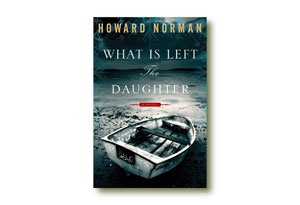Reading Questions for What Is Left the Daughter
Warning: May contain spoilers

1. What Is Left the Daughter begins with a love triangle. How many other triangular relationships appear in the book? Why, do you think?
2. How do Wyatt and Reese Mac Isaac interact with each other? Were you surprised by Wyatt's response to and relationship to her? Why do you think Howard Norman chose telephone operator as Reese's profession?
3. "Maybe I take things with the radio too personally," (page 3) Wyatt says. Why? What do radios mean to him? How do they appear throughout the book and what is their significance?
4. The Highland Book of Platitudes is referred to often throughout What Is Left the Daughter (see, in particular, pages 48-49); what is its significance? What are platitudes, and why does Tilda, and later Wyatt, put such stock in the ones in the book? What does it say about Hans Mohring that he belittles platitudes (page 49)?
5. Why do you think Donald grows obsessed with newspaper clippings and radio bulletins? Do you think this is a realistic characterization? What do you think Howard Norman is saying, through the character of Donald, about lives in wartime?
6. For Wyatt, Tilda was "too much beauty" (page 29). Have you experienced this yourself? How did Tilda think of Wyatt?
7. Cornelia Tell says, "In your life happiness is either cut to your length or isn't" (page 20). What do you think of this idea that happiness and sadness are predetermined to each person? How do you see this played out in the novel? Is happiness cut to Wyatt's length?
8. How do you react to Tilda's calling as a professional mourner? To Hans Mohring writing his own obituary? How are these choices fitting?
9. How is Tilda's adoption used in the novel? What is important about her being adopted? How does it affect her relationships with Donald and Constance, and the way she loses each of them?
10. Many of the characters in this book have lost one or both parents. How does this loss affect them? What do you think it means, in particular, to Marlais? And how might it contribute to Wyatt's decision to write to her?
11. The town of Middle Economy is depicted with such realism that it in some ways becomes a character. Why and how do you think the setting is important to the author? Are there other authors you've read who make places feel like actual characters?
12. Canada—Nova Scotia in particular—had a real role in WWII. Were the representations of U-boat activity and the impact on regular citizens and village life during wartime a surprise to you?
13. Did you find Wyatt's actions immediately after Hans' murder shocking or somehow understandable? Why? Likewise, did you feel Tilda's reaction to and relationship with Wyatt upon his return to Middle Economy beyond understanding, or not?
14. Water and water scenes have haunting roles in What Is Left the Daughter. Can you trace some of them?
Read O's review
Get more reading guides
2. How do Wyatt and Reese Mac Isaac interact with each other? Were you surprised by Wyatt's response to and relationship to her? Why do you think Howard Norman chose telephone operator as Reese's profession?
3. "Maybe I take things with the radio too personally," (page 3) Wyatt says. Why? What do radios mean to him? How do they appear throughout the book and what is their significance?
4. The Highland Book of Platitudes is referred to often throughout What Is Left the Daughter (see, in particular, pages 48-49); what is its significance? What are platitudes, and why does Tilda, and later Wyatt, put such stock in the ones in the book? What does it say about Hans Mohring that he belittles platitudes (page 49)?
5. Why do you think Donald grows obsessed with newspaper clippings and radio bulletins? Do you think this is a realistic characterization? What do you think Howard Norman is saying, through the character of Donald, about lives in wartime?
6. For Wyatt, Tilda was "too much beauty" (page 29). Have you experienced this yourself? How did Tilda think of Wyatt?
7. Cornelia Tell says, "In your life happiness is either cut to your length or isn't" (page 20). What do you think of this idea that happiness and sadness are predetermined to each person? How do you see this played out in the novel? Is happiness cut to Wyatt's length?
8. How do you react to Tilda's calling as a professional mourner? To Hans Mohring writing his own obituary? How are these choices fitting?
9. How is Tilda's adoption used in the novel? What is important about her being adopted? How does it affect her relationships with Donald and Constance, and the way she loses each of them?
10. Many of the characters in this book have lost one or both parents. How does this loss affect them? What do you think it means, in particular, to Marlais? And how might it contribute to Wyatt's decision to write to her?
11. The town of Middle Economy is depicted with such realism that it in some ways becomes a character. Why and how do you think the setting is important to the author? Are there other authors you've read who make places feel like actual characters?
12. Canada—Nova Scotia in particular—had a real role in WWII. Were the representations of U-boat activity and the impact on regular citizens and village life during wartime a surprise to you?
13. Did you find Wyatt's actions immediately after Hans' murder shocking or somehow understandable? Why? Likewise, did you feel Tilda's reaction to and relationship with Wyatt upon his return to Middle Economy beyond understanding, or not?
14. Water and water scenes have haunting roles in What Is Left the Daughter. Can you trace some of them?
Read O's review
Get more reading guides



